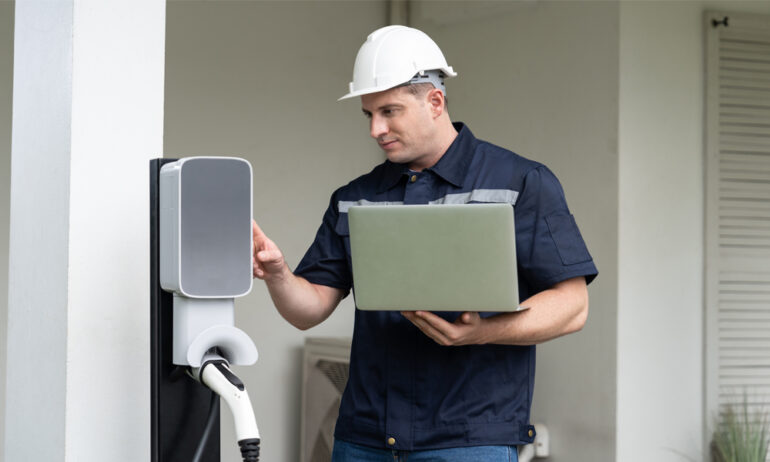Yes, you need a permit to install an EV charger. Permit requirements vary by location and may involve electrical and building inspections.
Installing an electric vehicle (EV) charger at your home or business is an exciting step towards reducing your carbon footprint and saving money on fuel costs. However, before you embark on this project, it’s important to be aware of the permitting requirements.
Depending on your location, you may need to obtain a permit for the installation of an EV charger, which often involves electrical and building inspections to ensure safety and compliance with local regulations. This article will provide you with essential information about the permitting process for installing an EV charger, helping you navigate through the necessary steps and ensuring a smooth and successful installation process.

Credit: qmerit.com
Overview Of Ev Chargers
Overview of EV Chargers:
Types Of Ev Chargers
When installing an EV charger, it’s essential to understand the different types available:
- Level 1 Chargers: Plug directly into a standard outlet.
- Level 2 Chargers: Require professional installation, faster charging.
- DC Fast Chargers: Rapid charging, typically used for public charging stations.
Benefits Of Ev Chargers
There are numerous advantages to installing an EV charger:
- Environmental Impact: Reduces emissions, promotes sustainability.
- Cost Savings: Lower fuel and maintenance costs compared to gas-powered vehicles.
- Convenience: Charging at home eliminates the need for frequent trips to gas stations.

Credit: www.hellotech.com
Importance Of Permits For Ev Charger Installation
Installing an electric vehicle (EV) charger at your home or place of business is a smart decision that promotes sustainability and reduces your carbon footprint. However, before diving into the installation process, it’s crucial to understand the importance of obtaining the necessary permits. Permit requirements for EV charger installation may vary based on local regulations, and obtaining them is essential for ensuring safety compliance and avoiding potential legal issues.
Understanding Local Regulations
Local regulations play a vital role in determining whether you need a permit for installing an EV charger. Municipalities and local authorities often have specific guidelines regarding the installation of electrical equipment, including EV chargers. Prior to installation, research the permitting requirements in your area to ensure compliance with local regulations. Thorough understanding of these regulations will save you from potential penalties and ensure a hassle-free installation process.
Ensuring Safety Compliance
Obtaining a permit for your EV charger installation is crucial for ensuring safety compliance. Permits often require inspections by qualified inspectors to verify that the installation meets safety standards and electrical codes. This ensures that the installation is conducted safely and reduces the risk of electrical hazards. By obtaining the necessary permit, you prioritize the safety of your property and those who will be using the EV charger.
Determining The Need For A Permit
Installing an EV charger? Find out if a permit is needed to avoid any legal complications and ensure a smooth installation process. Simplify the process by determining the need for a permit beforehand.
Installing an electric vehicle (EV) charger is an excellent way to embrace sustainability and reduce your carbon footprint. However, before embarking on this exciting endeavor, it is crucial to determine whether you need a permit. Understanding permit requirements for EV charger installations is essential to ensure a smooth and legal process. Let’s delve into the factors that determine the need for a permit, whether it’s for residential or commercial installations.
Residential Vs. Commercial Installations
In the realm of EV charger installations, it is necessary to differentiate between residential and commercial installations when it comes to permit requirements. For homeowners planning to add an EV charger to their property, the need for a permit typically depends on various factors, such as local building codes and regulations. On the other hand, commercial installations, including workplaces, parking facilities, or multi-unit residential buildings, may have additional requirements due to higher electricity demand and potential safety concerns.
Understanding Permit Requirements
Permit requirements differ based on your location, so it is crucial to consult with your local authority or building department before beginning the installation process. Here are some key points to consider:
- Evaluate Building Codes: Check if your region has specific building codes or regulations related to EV charger installations. These might include electrical safety standards and specific installation guidelines.
- Consider Load Capacity: Ensure that the electric infrastructure of your property can support the additional load generated by the EV charger. An electrical professional can assess and make recommendations to meet the required load capacity.
- Understand Zoning Regulations: Determine whether your property is subject to zoning regulations that require permits for outdoor installations, such as mounting chargers on walls or installing them in visible locations.
- Consider Safety Measures: Certain areas may need safety measures like ground-fault circuit interrupters (GFCIs) or circuit breakers to protect against electrical hazards. Understanding and abiding by these requirements is vital for a safe installation.
Conclusion
By understanding the need for a permit and adhering to the relevant requirements, you can ensure a hassle-free installation of your EV charger. Remember, your local authorities and electrical professionals are there to assist you, so reach out to them for guidance throughout the process.
Application Process For Permits
When it comes to installing an electric vehicle (EV) charger at your property, obtaining the necessary permits is an essential step to ensure compliance with local regulations. The application process for permits involves contacting the relevant authorities, submitting required documents, and adhering to specific guidelines. Let’s delve into each of these steps in more detail.
Contacting The Relevant Authorities
Before initiating the installation of an EV charger, it’s imperative to reach out to the relevant local authorities to inquire about the specific permit requirements. This can typically be done by contacting the building or planning department of your municipality. Be prepared to provide detailed information about the proposed installation, including the location, type of charger, and any applicable electrical work.
Submitting Required Documents
Upon contacting the authorities and understanding the necessary permit documentation, you will need to gather and submit the required paperwork. This may include a completed permit application form, a site plan illustrating the proposed charger location, and potentially electrical schematics or contractor certifications. It’s crucial to ensure that all documents are accurately completed and meet the specified requirements to facilitate a smooth permit approval process.
Common Permitting Challenges
Installing an electric vehicle (EV) charger at your home can provide convenience and sustainability, but before you can begin the installation process, it’s important to be aware of the common permitting challenges associated with this project. From dealing with zoning restrictions to addressing HOA regulations, obtaining the necessary permits can sometimes be a complex and time-consuming process. Below we discuss two common permitting challenges that you may encounter when installing an EV charger.
Dealing With Zoning Restrictions
Zoning restrictions can pose a significant challenge when it comes to installing an EV charger on your property. Zoning regulations vary from one location to another, and some areas may have specific requirements or restrictions that you need to comply with. For instance, there may be setback requirements that specify how far the charger must be from the property boundaries or neighboring structures. Additionally, some areas have aesthetic considerations, meaning that the charger must blend in with the surrounding environment. To navigate these challenges, it’s recommended to consult with your local planning or zoning department to understand the specific regulations in your area.
Addressing Hoa Regulations
If you live in a community governed by a homeowners association (HOA), you’ll need to address their regulations before installing an EV charger. HOAs often have their own set of rules and guidelines that may impact your ability to install a charger. Some HOAs require prior approval for any modifications to the exterior of your property, including the installation of an EV charger. It’s crucial to review your HOA’s covenants, conditions, and restrictions (CC&Rs) to ensure you comply with their regulations. If necessary, you may need to submit an application or seek approval from the HOA board. Understanding these regulations ahead of time can help you navigate the permit process more smoothly and avoid potential conflicts with your HOA.
Alternative Charging Solutions
Exploring alternative options for Charging Solutions can provide flexibility and convenience for installing an EV charger. Consider the following:
Wireless Charging Options
Wireless chargers eliminate the hassle of tangled cords by utilizing inductive charging technology.
Portable Charging Units
Portable units offer versatility, allowing you to charge your EV anywhere there is an available power source.
Cost Considerations
Before installing an EV charger, check if a permit is required. Factor in the permit cost, which varies by location. Hiring a certified electrician adds to the overall expense. Always consider these financial aspects before proceeding with the installation.
Permit Fees
Installation Costs
Installing an EV charger involves permit fees and installation costs that you should factor into your budget.
Permit Fees
Permit fees for EV charger installations typically range from $50 to $200. These fees cover the cost of obtaining the necessary permits from your local municipality.
Installation Costs
The installation costs for an EV charger can vary depending on factors like the type of charger and the complexity of the installation. On average, you can expect to pay $500 to $2,000 for installation.
Exploring Financial Incentives: Before proceeding with your EV charger installation, explore financial incentives available in your area. These incentives can help offset some of the costs associated with installing an EV charger.

Credit: www.linkedin.com
Frequently Asked Questions
Can I Install My Own Ev Charger?
Yes, you can install your own EV charger if you have the necessary skills and follow safety guidelines.
Can A Local Electrician Install An Ev Charger?
Yes, a local electrician can install an EV charger efficiently and safely at your residence or commercial property.
Do I Need A Permit To Install An Ev Charger In Texas?
Yes, you need a permit to install an EV charger in Texas.
Do I Need A Permit To Install An Ev Charger In California?
Yes, you need a permit to install an EV charger in California. It’s required by the state and local regulations to ensure safety and compliance.
Conclusion
Obtaining a permit to install an EV charger is important to comply with local regulations and ensure safety. It may involve some paperwork and fees, but the process is straightforward and necessary. By obtaining a permit, you can avoid fines and ensure that your charging station is installed properly, providing convenience and peace of mind.